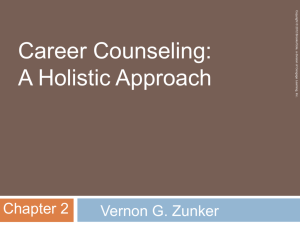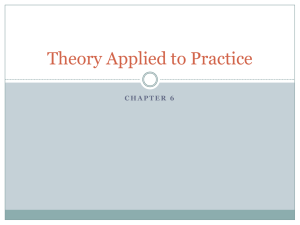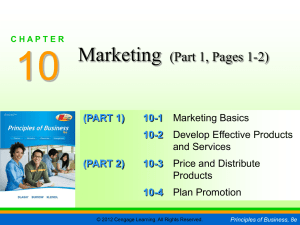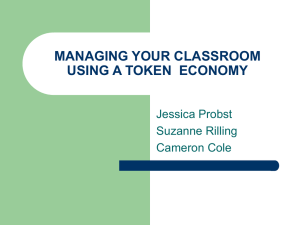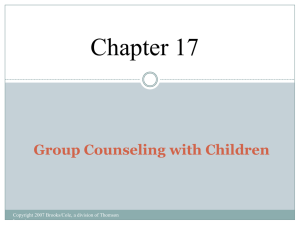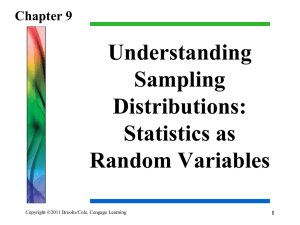Post Modern Approaches
advertisement
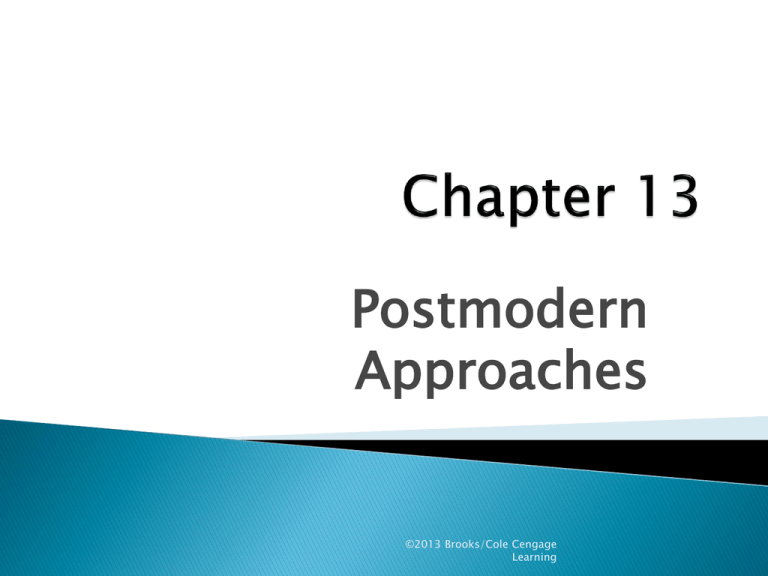
Postmodern Approaches ©2013 Brooks/Cole Cengage Learning Postmodernists assume there are multiple truths - Reality is subjective and is based on the use of language Postmodernists strive for a collaborative and consultative stance Postmodern thought has an impact on the development of many theories Theory and Practice of Counseling and Psychotherapy - Chapter 13 (3) ©2013 Brooks/Cole Cengage Learning The client, not the therapist, is the expert Dialogue is used to elicit perspective, resources, and unique client experiences Questions empower clients to speak and to express their diverse positions The therapist supplies optimism and the process Theory and Practice of Counseling and Psychotherapy - Chapter 13 (1 ) ©2013 Brooks/Cole Cengage Learning Generate new meanings in the lives of clients Co-develop, with clients, solutions that are unique to the situation Enhance awareness of the impact of various aspects of the dominant culture on the individual Help people develop alternative ways of being, acting, knowing, and living Theory and Practice of Counseling and Psychotherapy - Chapter 13 (2) ©2013 Brooks/Cole Cengage Learning Therapy grounded on a positive orientation-people are healthy and competent SFBT shares similarities with positive psychology Past is downplayed, while present and future are highlighted Therapy is concerned with looking for what is working Theory and Practice of Counseling and Psychotherapy - Chapter 13 (4) ©2013 Brooks/Cole Cengage Learning Therapists assist clients in finding exceptions to their problems There is a shift from “problem-orientation” to “solution-focus” Emphasis is on constructing solutions rather than problem solving Theory and Practice of Counseling and Psychotherapy - Chapter 13 (5) ©2013 Brooks/Cole Cengage Learning The problem itself may not be relevant to finding effective solutions People can create their own solutions Small changes lead to large changes Theory and Practice of Counseling and Psychotherapy - Chapter 13 (6) ©2013 Brooks/Cole Cengage Learning The client is the expert on his or her own life The best therapy involves a collaborative partnership A therapist’s “not knowing” affords the client an opportunity to construct a solution Theory and Practice of Counseling and Psychotherapy - Chapter 13 (7) ©2013 Brooks/Cole Cengage Learning Skillful questions allow people to utilize their resources Asking “how questions” that imply change can be useful Effective questions focus attention on solutions Theory and Practice of Counseling and Psychotherapy - Chapter 13 (8) ©2013 Brooks/Cole Cengage Learning Questions can get clients to notice when things were better Useful questions ◦ help people pay attention to what they are doing ◦ open up possibilities to do something different Theory and Practice of Counseling and Psychotherapy - Chapter 13 (9) ©2013 Brooks/Cole Cengage Learning Customer-type relationship: Client and Complainant relationship: A client describes a Visitors: Clients come to therapy because therapist jointly identify a problem and a solution to work toward problem, but is not able or willing to take an active role in constructing a solution someone else thinks they have a problem Theory and Practice of Counseling and Psychotherapy - Chapter 13 (10) ©2013 Brooks/Cole Cengage Learning Pre-therapy change ◦ What have you done since you made the appointment that has made a difference in your problem? Exception questions ◦ Direct clients to times in their lives when the problem did not exist Theory and Practice of Counseling and Psychotherapy - Chapter 13 (11) ©2013 Brooks/Cole Cengage Learning Miracle question ◦ If a miracle happened and the problem you have was solved, what would be different in your life? Scaling questions ◦ On a scale of zero to 10, where zero is the worst you have been and 10 represents the problem being solved, where are you with respect to __________? Theory and Practice of Counseling and Psychotherapy - Chapter 13 (12) ©2013 Brooks/Cole Cengage Learning Formula First session Task ◦ From 1st to 2nd session- observe things in your life that you want to maintain Therapist Feedback end of sessions ◦ Compliment ◦ Bridge – rational for suggestion/homework ◦ Tasks Observational Task – focus on positive changes Behavioral Task – do more of or do differently Theory and Practice of Counseling and Psychotherapy - Chapter 13 (12) ©2013 Brooks/Cole Cengage Learning Optimistic orientation helps clients make significant moves toward building more satisfying lives in a relatively short period of time The postmodern approaches’ dim view of diagnosis remind us that people cannot be reduced to a specific problem Theory and Practice of Counseling and Psychotherapy - Chapter 13 (27) ©2013 Brooks/Cole Cengage Learning A major strength of solution-focused a therapy is the use of questioning to generate solutions Brief therapy has been shown to be effective for a wide range of clinical problems Theory and Practice of Counseling and Psychotherapy - Chapter 13 (28) ©2013 Brooks/Cole Cengage Learning Therapists must be skilled in implementing brief interventions Therapists may employ techniques in a mechanistic fashion Reliance on techniques may detract from building a therapeutic relationship Theory and Practice of Counseling and Psychotherapy - Chapter 13 (29) ©2013 Brooks/Cole Cengage Learning
